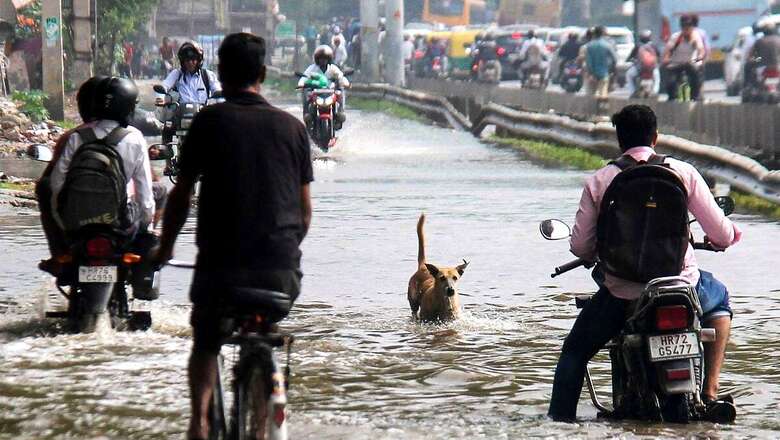
views
The weather office predicted extremely heavy rainfall over Gujarat, Saurashtra and Kutch for Tuesday, September 3. Heavy rainfall has also been predicted in several other states including Punjab, Telangana, Himachal Pradesh, Jammu & Kashmir as well as some Northeastern states like Assam, Meghalaya and Manipur.
As per the weather agency’s bulletin, “A well-marked low-pressure area over northwest Arabian Sea now lies over northwest and adjoining west central Arabian Sea. It is likely to continue to move further south-south-westwards and weaken gradually into a low-pressure area during next 12 hours.”
Heavy Rains in Gujarat
Several parts of Gujarat received heavy rain on Monday, with Bharuch city getting 120 millimetres between 4pm and 6pm. The India Meteorological Department predicted widespread rain in the state this week. The state had seen extremely heavy rains last week, which caused widespread flooding.
The IMD said cyclone ‘Asna’ that had formed off the coast of Kutch on Friday had turned into a depression and moved further south-southwestwards in the Arabian sea on Monday. The state government said 132 reservoirs are on ‘high alert’, while 10 rivers are overflowing.
Andhra, Telangana Reel Under Rain Fury
Torrential downpour in Telangana and Andhra Pradesh left 31 persons dead, battered roads and rail tracks snapping connectivity, submerged thousands of acres of agricultural crops and left people scampering for daily needs as rescue agencies were pressed into rescue and rehabilitation efforts.
The two Telugu speaking states were reeling under the impact of the rains on Monday, as 16 persons were killed in Telangana and 15 others in the neighbouring Andhra Pradesh, which particularly bore the brunt of the rain fury.
Andhra Pradesh Chief Minister N Chandrababu Naidu on Tuesday directed all officials in the state to pull up their socks and work efficiently in extending relief and helping flood victims, following the unprecedented rainfall and floods, especially in Vijayawada.
The chief minister said he is undertaking surprise inspections in the flood-affected areas and directly eliciting feedback from the people through the Interactive Voice Response System (IVRS) mode.
(with agency inputs)


















Comments
0 comment